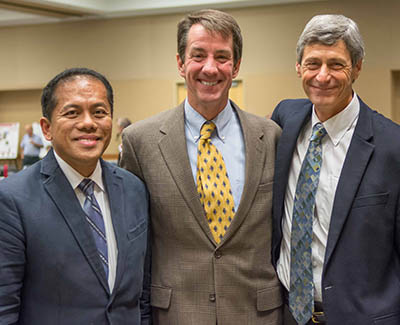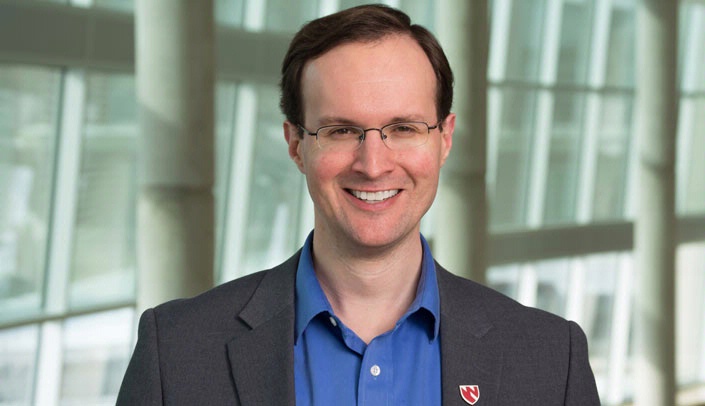UNMC’s David Warren, Ph.D., chose his words carefully, knowing his 10-minute research pitch could land him a one-year, $20,000 pilot grant by night’s end.
“I tried to keep it lighter than I would have for a roomful of neuroscience Ph.D.s,” Dr. Warren said.
In this “Shark Tank”-like environment, it worked.
 |
From left, J. Rafael Gorospe M.D., Ph.D., project officer on the IDeA-CTR grant, keynote speaker Christopher Austin, M.D., director, National Center for Advancing Translational Sciences, NIH, and Matthew Rizzo, M.D., chair of the UNMC Department of Neurological Sciences. |
“I was honored to be selected,” he said. “And, I’m thrilled to take the next steps to bring this project to life.”
Dr. Warren edged out four other finalists to win the Superstar Competition, capping the first day of the inaugural Great Plains IDeA-CTR Annual Scientific Meeting.
The two-day event, hosted by UNMC on Oct. 23-24, brought together nearly 200 people interested in clinical and translational research including representation from the National Institutes of Health and research partners from North and South Dakota, Nebraska and Kansas.
Said keynote speaker Christopher Austin, M.D., director, National Center for Advancing Translational Sciences, NIH: “I enjoyed the opportunity to learn more about the Great Plains IDeA-CTR’s work – including efforts to train the next generation of translational researchers – and sharing my vision for how NCATS-supported investigators could collaborate with CTR researchers to advance mutual translational science goals.”
Dr. Warren’s translational goal is to apply noninvasive brain stimulation to healthy older adults to enhance their memory abilities using an approach described by earlier research studies. In previous studies of younger adults by Dr. Warren’s colleagues, similar noninvasive brain stimulation improved memory upwards of 20 percent.
The most common cognitive complaint in healthy aging, he said, is that memory gets worse. “If we can demonstrate that this technique improves memory in healthy older adults, then we can try it in individuals with mild memory impairment. The long-term goal will then be to extend it to patients with Alzheimer’s disease.”
Dr. Warren is in the process of obtaining IRB approval on the study titled “Targeted transcranial magnetic stimulation to improve hippocampal-dependent declarative memory abilities in older adults,” before issuing a limited call for subjects.
“Memory and cognition have been lifelong interests of mine,” said the son of two psychologists. “Loss of memory changes identity and independence radically and I want to help individuals, families, and our society address age-related changes in memory, whether healthy or non-healthy.”

Congratulations to Dr. Warren and all of the IDeA-CTR Superstar finalists! My understanding is that the presentations were recorded; will the GPCTR be publishing them so that those of us who were unable to attend can see what it takes to be a superstar?